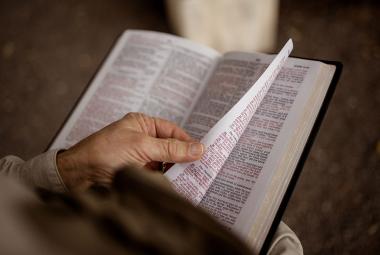You can't help but love Peter. He was the most lovable of the disciples: bold, candid, human. Peter was one of the first disciples called; he always stands first in the lists of disciples; he was also one of the three who formed an inner circle around the Master.1 His impulsive devotion is frequently portrayed,2 and he acted as spokesman of the Twelve.3 (At the crisis near Caesarea Philippi, he is the representative of the whole band: for the question is directed to them all,4 and all are included in the look that accompanies the subsequent reprimand. 5 )
Even in his disastrous boast,6 he is also representative of the disciples; and, as Peter's protestations of loyalty are the loudest, so his rejection of the Lord is the most explicit.7 He is, however, specially marked out by the message of the resurrection,8 and received a personal visitation of the risen Lord.9
Peter's original name was, in Hebrew, Simeon 10 ("Simon," as rendered in the New Testament, was a Greek name of similar sound). It was as a disciple that Simon received his new title, the Aramaic Kepha (Cephas) , "rock" or "stone,"11 usually appearing in the New Testament in the Greek form, Petros .
His father's name was Jonah.12 Peter himself was married,13 and in his missionary days his wife accompanied him.14 His place of origin was Beth-Saida, a largely Greek city,15 but he had made his home in Capernaum in Galilee.16
Simon spoke Aramaic with a strong north country accent, 17 and maintained the piety and outlook of his people, 18 though not trained in the law. 19 It is likely that he was affected by John the Baptist's movement:20 his brother Andrew was a disciple of John.21 He and his brother were partners with James and John in a fishing business.
Case Study of In-filling
Often characterized by having rhetorical "foot-in-mouth disease," Peter's behavior in the Gospels exhibits a unique ability to say the wrong thing at the wrong time. It is very instructive to contrast his clumsiness in the Gospels with his performance after being filled with the Holy Spirit in the Book of Acts! His spontaneous sermons in Acts 2 and 3 are elegant masterpieces of craftsmanship.22
"More Sure Word"?
Another provocative assertion of Peter occurs in his second letter: after emphasizing the basis of being eyewitnesses at the Transfiguration, 23 he remarks,
We have also a more sure word of prophecy; whereunto ye do well that ye take heed, as unto a light that shineth in a dark place, until the day dawn, and the day star arise in your hearts: Knowing this first, that no prophecy of the scripture is of any private interpretation. For the prophecy came not in old time by the will of man: but holy men of God spake as they were moved by the Holy Ghost.
2 Peter 1:19-21
"More sure word of prophecy"? What could be even more certain than having been an eyewitness? His explicit legacy is a foundational discovery for every one of us: The proof of inspiration of Bible prophecy is compelling! It invariably rewards - and changes the entire life of - the diligent student.24
Peter's two letters are among the most important prophetic passages in the New Testament. He attacks the very skepticism that has come to characterize even the Christian circles of today:
Knowing this first, that there shall come in the last days scoffers, walking after their own lusts, And saying, Where is the promise of His coming? for since the fathers fell asleep, all things continue as they were from the beginning of the creation.
2 Peter 3:3-4
Skepticism over "the promise of His coming" is characteristic even of many of the churches today. The embracing of uniformitarianism of evolution is here linked by Peter with the skepticism of Biblical prophecy. The tragic dismissal of critical prophetic passages by the heretical doctrines of Preterism, Reconstructionism, the Dominionists, et al., has become a serious denial by the "Christianity" of our current culture.
Peter has given us two very provocative letters (and many also ascribe Mark's Gospel to Peter). We strongly encourage you to undertake a serious study of these two brief epistles of this engaging champion; they are especially relevant to each of us today. (And the Lord always rewards the diligent student!)
Our verse-by-verse expositional commentary, available on audio tape cassettes, is now also available on CD-ROM: the audio in MP3 format, and the notes in PDF format. (All the necessary software is also included for both.)
Notes:
- Mark 5:37; 9:2; 14:33; cf. 13:3.
- Cf. Matthew 14:28; Mark 14:29; Luke 5:8; John 21:7.
- Mt 15:15; 18:21; Mk 1:36f; 8:29; 9:5; 10:28; 11:21; 14:29ff; Lk 5:5; 12:41.
- Mark 8:27, 29.
- Mark 8:33.
- Mark 14:29ff.
- Mark 14:66ff.
- Mark 16:7.
- Luke 24:34; 1 Corinthians 15:5.
- Acts 15:14; 2 Peter 1:1.
- 1 Corinthians 1:12; 15:5; Galatians 2:9.
- Matthew 16:17.
- Mark 1:30.
- 1 Corinthians 9:5.
- John 1:44.
- Mark 1:21ff.
- Mark 14:70.
- Cf. Acts 10:14.
- Acts 4:13; his literacy is not in question.
- Cf. Acts 1:22.
- John 1:39ff.
- Acts 2:14-42; 3:12-26.
- 2 Peter 1:16-18.
- A mathematical demonstration of this very issue is featured in our Briefing Pack, Beyond Coincidence; it is also featured in Learn the Bible in 24 Hours.






